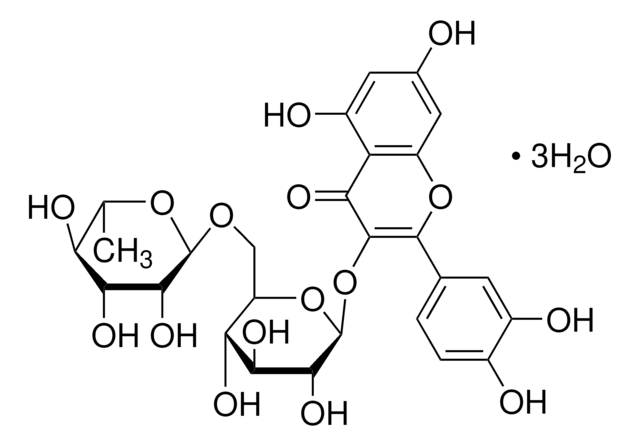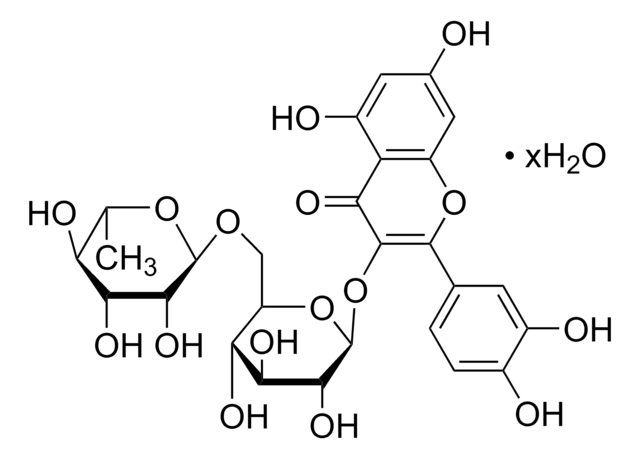About This Item
Recommended Products
grade
primary reference standard
product line
phyproof® Reference Substance
Assay
≥90.0% (HPLC)
form
solid
manufacturer/tradename
PhytoLab
storage temp.
−20°C
SMILES string
[H]C1([H])C2OC3([H])OC=CC3(O)C1C4(C)OC24[C@@]5(C)[C@@H](O)[C@@H]6OC[C@]7([C@H](C[C@H](OC(=O)C(C)=CC)[C@]8(COC(O)([C@H]58)C(=O)OC)[C@@]67[H])OC(C)=O)C(=O)OC
InChI
1S/C35H44O16/c1-8-15(2)24(38)49-18-12-19(48-16(3)36)32(26(39)43-6)13-46-21-22(32)31(18)14-47-34(42,27(40)44-7)25(31)29(4,23(21)37)35-20-11-17(30(35,5)51-35)33(41)9-10-45-28(33)50-20/h8-10,17-23,25,28,37,41-42H,11-14H2,1-7H3/t17?,18-,19?,20?,21+,22+,23?,25?,28?,29?,30?,31?,32-,33?,34-,35?/m0/s1
InChI key
FTNJWQUOZFUQQJ-CFYAVYSVSA-N
Looking for similar products? Visit Product Comparison Guide
General description
Application
- Enhancing Biopesticide Efficacy: Research on the compatibility of entomopathogenic nematodes with chemical insecticides, including azadirachtin, for controlling Drosophila suzukii highlights azadirachtin′s potential as part of integrated pest management strategies in agriculture, emphasizing its role in organic pest control (Dias et al., 2024).
- Proteomic Insights into Azadirachtin Production: A study focused on enhancing azadirachtin production in neem through NaCl elicitation provides insights into the differential protein regulation, advancing the understanding of azadirachtin biosynthesis which is critical for its commercial production and application in biopesticide formulations (Omar et al., 2024).
- Pesticide Efficacy Analysis: Evaluation of conventional and organic pesticides′ efficacy, including azadirachtin, following ingestion by crop pests, underscores its effectiveness and safe application in managing pest populations without harming the environment, crucial for sustainable agricultural practices (Dugger et al., 2024).
- Toxicity Assessment of Botanical Pesticides: Investigating the effects of botanical pesticides such as azadirachtin on invertebrate species highlights its impact on non-target species, contributing valuable data for ecological risk assessments and regulatory decisions in pest control (Oluwamodupe et al., 2024).
- Botanical Pesticide Exposure Study: A detailed study of the effects of botanical pesticides, including azadirachtin, on ant species explores ecological interactions and pesticide impacts, providing insights into non-target effects and environmental safety considerations in pesticide use (Liang et al., 2023).
Biochem/physiol Actions
Legal Information
Signal Word
Warning
Hazard Statements
Precautionary Statements
Hazard Classifications
Aquatic Acute 1 - Aquatic Chronic 1 - Skin Sens. 1B
Storage Class Code
11 - Combustible Solids
WGK
WGK 3
Flash Point(F)
Not applicable
Flash Point(C)
Not applicable
Choose from one of the most recent versions:
Already Own This Product?
Find documentation for the products that you have recently purchased in the Document Library.
Our team of scientists has experience in all areas of research including Life Science, Material Science, Chemical Synthesis, Chromatography, Analytical and many others.
Contact Technical Service










